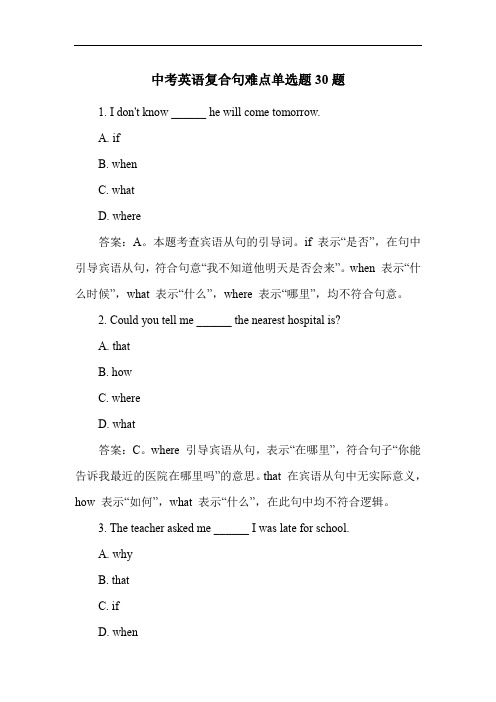中考英语专题复习复合句
初中英语中考复习专题:复合句

2. Could you tell me the way to the station? (改写句子,句意不 变) (青岛) can get to the station? Could you tell me how I 3. “I have finished my homework.” John told me. (改为复合句, 句意不变) (天津) had finished his homework. John told me that he 4. I don’t how I can reach the zoo. (改为简单句) (宿迁) to get to the zoo. I don’t know how
中考英语作文复合句

中考英语作文复合句How to Protect the Environment。
Nowadays, with the rapid development of industry and urbanization, the environment has been seriously polluted.It is high time that we took some effective measures to protect our environment.Firstly, we should make efforts to reduce air pollution. Factories should be equipped with advanced equipment to purify waste gas before discharging it into the air. Moreover, we should encourage people to use public transportation instead of driving their own cars, which can help reduce the emission of carbon dioxide.Secondly, we should pay attention to water pollution.It is reported that a large amount of industrial waste is discharged into rivers and lakes every day. As a result,the water becomes undrinkable and fish die. Therefore, we must take strict measures to control the discharge ofindustrial waste and punish those who violate the environmental protection laws.Thirdly, we should take measures to protect the wildlife. The destruction of forests has caused the loss of habitats for many animals. Therefore, we should take actions to protect the natural habitats of animals and prevent them from becoming extinct.In addition, we should raise people's awareness of environmental protection. Schools should include environmental protection education in their curriculum, and the government should organize various activities to promote environmental protection.In conclusion, protecting the environment is everyone's responsibility. We should take actions to reduce air and water pollution, protect the wildlife, and raise people's awareness of environmental protection. Only in this way can we create a beautiful and harmonious environment for future generations.。
初中英语中考 语法专题过关 专题十三 复合句

考点 宾语从句
考点1 考点2 考点3
易失分点 (1)"What's wrong/the matter(with sb.)?"作宾语从句时,其本身就是陈 述语序。如: He asked me what was the matter with you. 他问我你怎么了。 (2)当两个或多个由that引导的宾语从句由并列连词and连接时,除第 一个从句中的that可省略外,其余从句中的that都不可省略。如: He said (that) the book was interesting and that all the children liked reading it. 他说这本书很有趣,并且所有孩子都喜欢读。
①He asked me whose coat it was. 在从句中作一定
他问我这是谁的外套。②Do you 成分,如:主语、宾
know who broke the window? 你知 语、定语等
道是谁打碎了窗户吗?
考点 宾语从句
考点1 考点2 考点3 考点4
引导词
作用
连接副词:when, where, how, why 等
在宾语从句中,当谓语动词是think, believe, expect等表示"认为,猜想"的词时,若要否定宾 语从句,一般将主句变成否定句,即"否定前移"。如: I think they will lose the match. 我认为他们将会输掉这场比赛。(变为否定句)→ I don't think they will lose the match. 我认为他们不会输掉这场比赛。
中考英语作文高分复合句

Title: The Secret to Scoring High in English Composition during the Middle School ExamAs a high school student, I vividly remember the pivotal moment of the middle school exam, particularly the English composition section. It was a time when I realized the importance of constructing complex sentences to achieve a high score. Heres my story and the secret I discovered.In the leadup to the exam, I was always in search of ways to improve my English writing skills. I knew that a wellcrafted composition could make a significant difference in my overall score. One day, during an English class, our teacher introduced us to the concept of compound and complex sentences. It was a revelation for me.Before this lesson, my compositions were filled with simple sentences, which, while clear, lacked the depth and sophistication that could elevate my writing. Our teacher explained that compound sentences combine two independent clauses, while complex sentences contain an independent clause and at least one dependent clause. The use of these sentence structures not only made the writing more interesting but also demonstrated a higher level of language proficiency.I practiced incorporating compound and complex sentences into my compositions. For instance, instead of writing, I went to the library. I studied for my exam, I would write, After I went to the library, I studied for my exam. This not only connected my ideas more effectively but also showed my ability to use varied sentence structures.During the middle school exam, I applied this knowledge. My English composition was about a memorable day in my life. I used a complex sentence to describe the setting: As the sun rose over the horizon, casting a golden glow on the dewkissed grass, I embarked on a journey that would change my perspective on life. This sentence not only set the scene but also added a layer of complexity to my narrative.The result was a composition that was not only coherent and wellstructured but also rich in language and expression. When the results were announced, I was thrilled to see that my English score had significantly improved, largely due to the high marks I received for my composition.In conclusion, the secret to scoring high in English composition during the middle school exam lies in the strategic use of compound and complex sentences. This not only enhances the quality of your writing but also impresses the examiners with your linguistic prowess. My experience has taught me that with practice and the right techniques, anyone can master the art of writing highscoring compositions.。
中考英语专项复习复合句(21张)

A. that
B.which
C.who
D.whom
BDACA
二、 知识回顾
状语从句分类 时间状语从句
条件状语从句 原因状语从句 目的状语从句
结果状语从句
让步状语从句 比较状语从句 地点状语从句 方式状语从句
状语从句
从属连词 when, while, since, Until, as soon as If, unless, as long as because, as ,since So that, in order that
as long as: As long as we pull together, we will make it.
主从句时态遵循:主将从现,主祈从现,主情从现,主过从过。
二、 知识回顾
3、让步状语从句 though/although/even though/even if/while(不与but连用)
What does Tom like? 疑问句语序(主语在后,谓语动词在前)
疑问句语序 Where is Tom?
陈述句语序(宾语从句) it
Can you tell me where Tom is?
What can Tom do?
Can you tell me what Tom can do?
What does Tom like?
A. /
Hale Waihona Puke B. whatC. whose
D. who
4. We all like the boy ________whose name is Tom.
A. who
B. whom
C. whose
D. which
5. ---What are you doing?
中考英语复合句难点单选题30题

中考英语复合句难点单选题30题1. I don't know ______ he will come tomorrow.A. ifB. whenC. whatD. where答案:A。
本题考查宾语从句的引导词。
if 表示“是否”,在句中引导宾语从句,符合句意“我不知道他明天是否会来”。
when 表示“什么时候”,what 表示“什么”,where 表示“哪里”,均不符合句意。
2. Could you tell me ______ the nearest hospital is?A. thatB. howC. whereD. what答案:C。
where 引导宾语从句,表示“在哪里”,符合句子“你能告诉我最近的医院在哪里吗”的意思。
that 在宾语从句中无实际意义,how 表示“如何”,what 表示“什么”,在此句中均不符合逻辑。
3. The teacher asked me ______ I was late for school.A. whyB. thatC. ifD. when答案:A。
why 引导宾语从句,表示“为什么”,符合“老师问我为什么上学迟到”的语境。
that 无实际意义,if 表示“是否”,when 表示“什么时候”,都不符合句意。
4. I wonder ______ she will come to the party.A. ifB. thatC. whatD. who答案:A。
if 表示“是否”,句子意思是“我想知道她是否会来参加聚会”。
that 无意义,what 表示“什么”,who 表示“谁”,都不符合此句语境。
5. Do you know ______ he did last night?A. whereB. whatC. howD. when答案:B。
what 引导宾语从句,在句中作did 的宾语,表示“什么”,即“你知道他昨晚做了什么吗”。
where 表示“哪里”,how 表示“如何”,when 表示“什么时候”,都不能作did 的宾语。
中考英语语法语法专项之复合句

意为“是否”,不作句子成分,但不 He asked me if/whether Miss Wei was a
能省略
teacher. 他问我魏小姐是否是一名教师。
连接代词what, 在从句中作一定的成分,如:主语、I don’t know what they are going to do.
which, who,
一、宾语从句
拓展:
1. if引导的宾语从句和条件状语从句的区别 if在ask, wonder, know等动词后,当“是否”讲,引导宾语从句时,从句时态与语意 相关;if当“如果”讲,引导条件状语从句时,主从句时态遵循“主将从现”原则。 I don’t know if he will come tomorrow. 我不知道明天他是否会来。(宾语从句) If he comes, I will tell you. 如果他来,我将告诉你。(条件状语从句) 2. when引导的宾语从句和时间状语从句的区别 when引导宾语从句时,意为“何时”,从句时态与语意相关;when引导时间状语从 句时,意为“当...时候”,主从句时态遵循“主将从现”原则。 I wonder when my father will arrive in Beijing. 我想知道我爸爸什么时候到北京。 (宾语从句) He will call me when he arrives. 他到的时候会给我打电话。(时间状语从句)
一、宾语从句
2. 时态
需要性原则
呼应性原则 特殊性原则
当主句是一般现在时, 从句的时态不作限制, 根据句子的需要使用任 何一种时态。
He says he will ask Mr. Hu to give Jim some work
later. 他说稍后他将请胡先生给吉姆一些工作。
2025年广西中考英语二轮复习语法突破课件:复合句

即遵循“就近原则”
uncle.
“……和……都”,当连接两个 both…and… 并列的主语时,谓语动词用复数
形式
Both Tom and his father enjoy Chinese food.
连词词组
含义及用法
例句
“或者……或者……”,当
either…or… 连接两个并列主语时,谓语 Either he or you are right. 动词遵循“就近原则”
2.-Excuse me, would you please tell me ___A___? -Let me see.There are three toy boats. A.what is on the round table B.who your mother is C.which class you are in
so “所以”,表示结果
I had no money with me yesterday, so I bought nothing.
“因为”,表示原因,补充说 Mr. Black is patient, for he always
for
明理由或推断原因
explains problems carefully.
as soon as 一般现在时表将来,主句用一般将来 as soon as our holiday
时
begins.
★引导条件状语从句的从属连词(短语)
连词(短语)
含义及用法
例句
“如果”,若主句为一般将来时, We will have little water
if
从句常用一般现在时表示将来
to drink in the future if we
- 1、下载文档前请自行甄别文档内容的完整性,平台不提供额外的编辑、内容补充、找答案等附加服务。
- 2、"仅部分预览"的文档,不可在线预览部分如存在完整性等问题,可反馈申请退款(可完整预览的文档不适用该条件!)。
- 3、如文档侵犯您的权益,请联系客服反馈,我们会尽快为您处理(人工客服工作时间:9:00-18:30)。
(
C)
C. 4.
what did he say He asked me ________
during
the
summer
holiday.
A. where had I gone B. where I had gone
C. where I had been
Ⅰ. The Object Clause (宾语从句) 宾语从句是英语复合句中用来充
3. Whether + 动词不定式 Check the prices before you decide whether to
buy one 4. 宾语从句提前时只能用whether
Whether this is true or not, I can’t say.
Back
3. 连接代词who, whom, whose, what, which和 连接副词when, where how, why + 特殊疑问句 的宾语从句
if/whether都可作宾语从句的引导词,意为 “是否”,在一般情况下可以互换。
if
多用于口语和非正式文体中;
whether则多用于比较正式的文体中。
如:
She asked me if/whether__I_c_o_u_l_d_h_e_l_p_h__er__.
我是否能帮助她
I don’t know if/whether_i_t_i_s_g_o_in__g_t_o_r_a_i_n_. __
Note:
1.宾语从句的否定转移:
主句是I/We think/suppose/guess/believe等时,从句中的 否定习惯上要转移到主句中。
如:我认为鸡不会游泳。
I think chickens can not swim. ( )
I don’t think chickens can swim. ( )
当宾语的句子。 宾语从句一般由“引导词+主语+谓语+ 其它”构成,其语序是陈述句语序.
She said ( that she was from TCL.)
主句 引导词 主语 谓语
1. that+陈述句的宾语从句
主句的谓语动词是say, think, tell, know, hear, see, feel, mean, hope, wish, remember, forget等 时,或主句的谓语动词是由形容词afraid, glad, sure, sorry等作表语的系表结构时,后面常接 that引导的宾语从句。
例如: He says that_h_e_w__a_n_t_s_t_o_s_p_e_a_k__to__y_o_u_..
(他想要和你通话)
I’m sorry (that)__h_e_i_sn_’_t_h_e_r_e__ri_g_h_t_n_o_w.
他现在不在这里
that本身无意义,不充当任何成分,常被省略
Choose the right answers(抢答题)
( A ) 1. The visitor wants to know____ from Dongguan to
Guangzhou.
A. how far it is B. how far is it
C. how long it is D. how long is it
The Complex Sentences in Junior English:
初中英语教材中涉及到的复合句主要有: The Object Clause ( 宾 语 从 句 ) 、 The Adverbial Clause ( 状 语 从 句 ) 和 The Attributive Clause (定语从句)。其它诸如 主语从句、表语从句、同位语从句等形式 的复合句尽管在教材中也有出现,但在中 考中没有被列为重点考查范围。
B.whether has he come
C.whether he will come
D.that he will come
关于宾语从句的时态对应
主句
从句
1、一般现在时
A.过去的某一种时态
2、一般过去时
B.根据句意选择时态
*特别要注意的是当宾语从句表示的是客观真理、科的限制
( A) 2. Could you tell me________?
A . who you are waiting for
B. who were you waiting for
C. where you live in
( B) 3. Do you still remember_______?
A. that he said B. what he said
是否将要下雨
用陈述句语序
Back
Note: 只用whether的四种情况:
1. 在介词后 I’ m thinking of whether we should go fishing.
2. 直接与or not连用时 I don’t know whether or not they will come .
她将什么时候回来
连接代词/连接副词在宾语从句中充当一定Back 的子成份,不能省略
二、考点: 1.宾语从句的引导词
* 2. 从句中的语序为陈述语序; **3. 从句中的时态与主句时态前后呼应 如:
( C )I’d like to know_____or not.(2003年中考)
A. whether will he come
例如: Do you
know__W__h_o__w_i_ll_c_o_m__e_t_h_is__a_ft_e_r_n_o_o_n_?
(主语)
谁下午将要来
Did you hear__w__h_a_t_h_e__sa_i_d__? (宾语)
她说过什么吗
We didn’t know w__h_e_n_s_h_e__w_o_u_l_d_c_o_m__e_b_a_c_k_.__ (状语)
此外,上述情况在变成反意疑问句时,附加疑问句要 看从句,如果主句的主语不是第一人称,则附加疑问 句要看主句。 试比较:
I think he is wrong,___is_n_’_t_h_e_? He thinks he is right,__d_o_e_s_n_’t_h_e__ ?
2.if/whether + 一般疑问句的宾语从句
